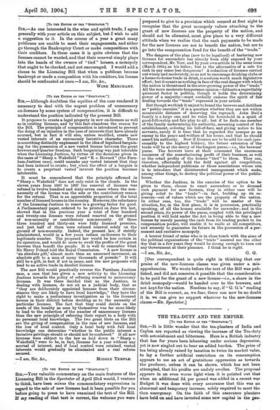Sia,—Your valuable commentary on the main features of the Licensing
Hill in the Spectator of April 23rd would, I venture to think, have been minus the commendatory expressions in regard to the sale of new licenses had it been possible for you before going to press to have examined the text of the Bill. If my reading of that text is correct, the welcome you were prepared to give to a provision which seened at first sight to recognise that the great monopoly values attaching to the grant of new licenses are the property of the nation, and should not be alienated, must give place to a very different attitude when we realise that the cash payments to be made for the new licenses are not to benefit the nation, but are to go into' the compensation fund for the benefit of the "trade."
The dangers of the plan (now to be legalised) of bartering new licenses for surrenders has already been ably exposed by your correspondent, Mr. Torr, and by your own article in the same issue (March 19th) as his letter ; but is the alternative of a sale for cash in any sense less dangerous ? A reduction of licenses carried out wisely and moderately, so as not to encourage drinking clubs or a house-to-house trade in drink, is a reform worth much legislative effort; but it counts as nothing in face of the real danger with which the nation is threatened in the ever-growing power of the "trade." All the more moderate temperance opinion—hitherto a regrettably quiescent factor in politics, though it holds the determining power of a majority—must cordially endorse the spirit of fair dealing towards the " tratle " expressed in your article.
But though we think it unjust to brand the brewers and distillers as "public enemies," it is a question whether they are not within measurable distance of deserving the reproach. John Bull's family is a large one, and he rules his household in a spirit of good-fellowship and fair play to all ; but if he finds one member of the family undermining his authority, assuming control of the establishment, ordering his bill-of-fare, and giving notice to his servants, surely it is time that he regarded the usurper as an enemy to the peace and welfare of his house, and that he should assert his authority. Now if licenses are to be sold for cash (pre- sumably to the highest bidder), the future extension of the trade will be at the mercy of the longest purse,—i.e., the brewers' purse. The brewers have at their command the enormous resources of the manufacturing profit of their business, as well as the retail profits of the houses " tied " to them. They can, therefore, effectually hold the field against all competitors, whether independent publicans or those associations whose 'aim is to introduce that disinterested management which seeks, among other things, to destroy the political power of the public.. house.
Whether the Justices, in the exercise of the option to be given to them, choose to exact surrenders or to demand cash payment for new licenses, they in either case will be giving relief to the " trade "—in fact, building up its re- sources—out of values which are the property of the nation. In either case, too, the "trade" will be master of the situation, for, in the first place, it is in possession, practically speaking, of all the houses available for surrender ; and in the second place, its power of the purse, coupled with the privileged position it will hold under the Act in being able to buy a new license by merely passing the cash from its trading pocket to its compensation pocket, will enable it to smile at all competitors, and securely to guarantee its future in the possession of a per- manent and exclusive monopoly.
A brewer friend of mine who is in close touch with the aims of the political organisations of the "trade" assured me the other day that in a few years they would be strong enough to turn out any Government at their pleasure. I think he is right.
—I am, Sir, &c., G. G.
[Our correspondent is quite right in thinking that our praise of the new-licenses clause was given under a mis- apprehension. We wrote before the text of the Bill was pub- lished, and did not conceive it possible that the consideration to be paid for the grant of a new license—i.e., a share in the drink monopoly—would be handed over to the brewers, and not kept for the nation. Needless to say, if "G. G.'s " reading of the Bill is correct, as, we fear, there can now be no doubt it is, we can give no support whatever to the new-licenses clause.—En. Spectator.] THE TEA-DUTY AND THE EMPIRE.






















































 Previous page
Previous page